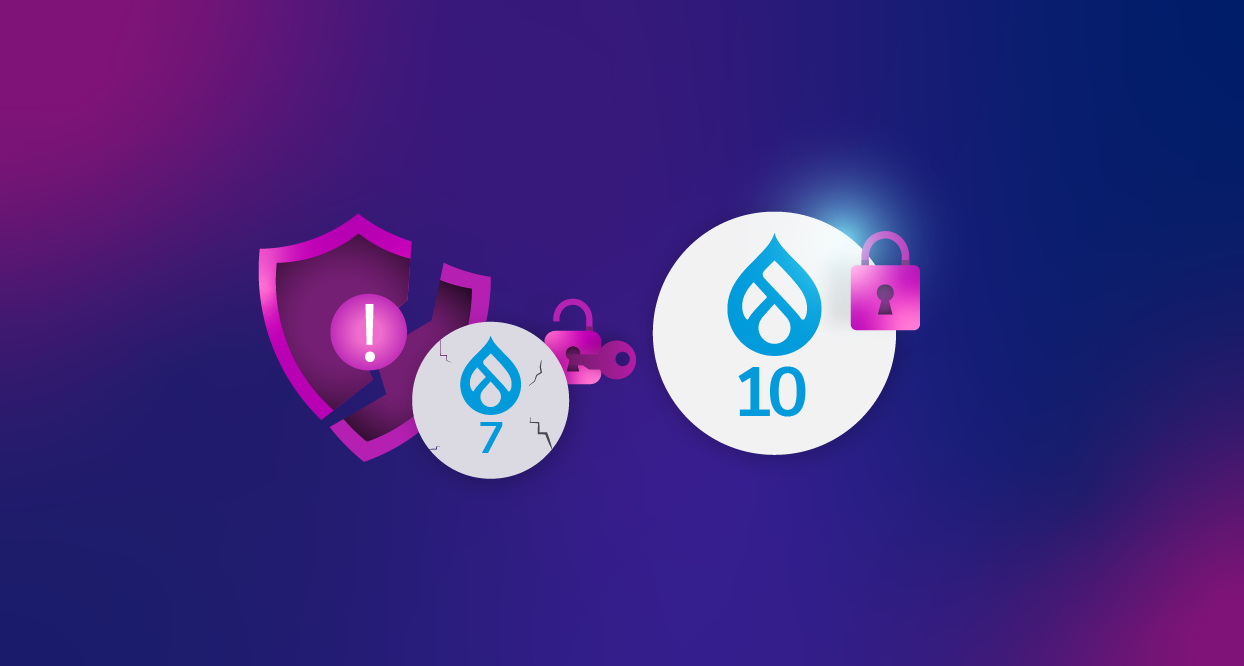A Guide to the Latest Security Updates for Drupal 7 Users

The Drupal Association announced in June 2023 that support for Drupal 7 has been extended for an additional 15 months from November 2023 to January 2025. While this is welcome news for many IT departments that were scrambling to move off of Drupal 7 by November, it isn’t the reprieve that it first appears to be.
It’s important to recognize that delaying the decision to upgrade to Drupal 7 could have a very real and negative impact on your organization. At the top of this list is security. When the Drupal Association announced that Drupal 7’s end of life was being extended a final time, it also announced that support for Drupal 7 after August 1, 2023 would change in significant ways. Read this article to learn about the top ways security will be impacted by staying on Drupal 7.
Changes to Security Updates for Drupal 7
Not all security issues will be addressed proactively with a security update release the same day an issue is announced. The Drupal Security Team may choose to not fix some moderately and less critical issues rather than report them to the public issue queue for the community to address. Without a patch or update to fix the issue, this can cause vulnerabilities to become publicly known. This, in turn, makes it easier for a site to be hacked or defaced, its users exploited, or their data to be compromised.
Module Implications
After August 1, 2023, the modules used to build and maintain Drupal 7 may no longer receive updates. Modules may be flagged as insecure or unsupported if the module maintainers have not sufficiently responded to requests of the Drupal Security Team. If this happens, the module will not be unflagged or marked as secure/supported ever again.
Say Goodbye to Some Security Advisories
Another security risk with Drupal 7 is that the security team will no longer issue security advisories alerting Drupal 7 site managers about security issues with unsupported libraries that are used by many Drupal 7 sites. This means that a library you are using, such as CKEditor 4, may have a security issue and it would be up to you to determine if your site is impacted and to fix the issue.
Security Shouldn’t be a “Hope for the Best” Scenario
With these changes to the security coverage for Drupal 7, site administrators will need to be more vigilant than before when it comes to securing their sites. Drupal 7 site owners are advised to keep a close watch on the Drupal Security Advisories page and the Drupal 7 Core issue queue for items that may impact their site’s health, security, and reputation. When an issue appears that needs to be addressed, businesses may not have the luxury to wait for a fix to be produced. Be prepared to fix issues that may arise if a security patch isn’t immediately available for Drupal 7. When site security is on the line, one cannot hope for the best.
Ensure Security With Drupal 10
Security issues alone should be motivation to proceed with the migration to Drupal 10. Upgrade to Drupal 10 today to ensure the security and longevity of your website. While Drupal 7’s end-of-life has been extended, it’s crucial to understand that relying on an outdated CMS version can pose serious risks to your organization. With limited proactive security updates and the potential for unsupported modules and libraries, delaying the upgrade could leave your site vulnerable to hacking and data breaches.
Take the leap to Drupal 10 and embrace a modern, secure, and feature-rich platform that aligns with current technology trends. For more information on Drupal 7 and the features you may be missing out on, check out this article.


